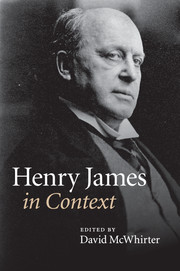Book contents
- Frontmatter
- Contents
- List of Illustrations
- Notes on Contributors
- Preface
- Abbreviations
- Chronology
- Part One Life and career, times and places
- Part Two Historical and cultural contexts
- Chapter 9 Aestheticism and Decadence
- Chapter 10 Authorship
- Chapter 11 Children
- Chapter 12 Consumer culture
- Chapter 13 Cosmopolitanism
- Chapter 14 Courtship, marriage, family
- Chapter 15 Ethics
- Chapter 16 Language
- Chapter 17 Law
- Chapter 18 Manners
- Chapter 19 Media and communication technologies
- Chapter 20 Modernism
- Chapter 21 Money and class
- Chapter 22 Museums and exhibitions
- Chapter 23 Nationalism and imperialism
- Chapter 24 Print culture
- Chapter 25 Psychology
- Chapter 26 Race
- Chapter 27 Realism and naturalism
- Chapter 28 Sexualities and sexology
- Chapter 29 Social sciences and the disciplines
- Chapter 30 Things
- Chapter 31 Time
- Chapter 32 Travel and tourism
- Chapter 33 Urbanity
- Chapter 34 Visual culture
- Chapter 35 Women and men
- Chapter 36 Work
- Part Three Reception
- Further reading
- Index
- References
Chapter 28 - Sexualities and sexology
Published online by Cambridge University Press: 05 August 2014
- Frontmatter
- Contents
- List of Illustrations
- Notes on Contributors
- Preface
- Abbreviations
- Chronology
- Part One Life and career, times and places
- Part Two Historical and cultural contexts
- Chapter 9 Aestheticism and Decadence
- Chapter 10 Authorship
- Chapter 11 Children
- Chapter 12 Consumer culture
- Chapter 13 Cosmopolitanism
- Chapter 14 Courtship, marriage, family
- Chapter 15 Ethics
- Chapter 16 Language
- Chapter 17 Law
- Chapter 18 Manners
- Chapter 19 Media and communication technologies
- Chapter 20 Modernism
- Chapter 21 Money and class
- Chapter 22 Museums and exhibitions
- Chapter 23 Nationalism and imperialism
- Chapter 24 Print culture
- Chapter 25 Psychology
- Chapter 26 Race
- Chapter 27 Realism and naturalism
- Chapter 28 Sexualities and sexology
- Chapter 29 Social sciences and the disciplines
- Chapter 30 Things
- Chapter 31 Time
- Chapter 32 Travel and tourism
- Chapter 33 Urbanity
- Chapter 34 Visual culture
- Chapter 35 Women and men
- Chapter 36 Work
- Part Three Reception
- Further reading
- Index
- References
Summary
Although biographical reconstruction of Henry James cannot underpin particular readings of sexuality in his fiction, it can make certain readings more convincing or plausible: how could a man whose sexual life was so invisible write so perceptively about sexuality? One popular answer, about which I am sceptical, is that writing became the place where James explored what he was afraid to explore in life.
James never married. Nor is it clear whether he ever had sex. In his own writing about himself (letters, notebooks, autobiographical writing) and in the writing of his contemporaries, there are no references to him being sexually active. This absence has meant that biographical accounts of James have given differing accounts of his sexual life, and none of these accounts can be regarded as conclusive. Yet all biographies of James have emphasized the importance of same-sex affection in his emotional life. One biographer of James, Sheldon Novick, claims that James had affairs with other men. The evidence on which Novick bases his claims is slight, however, and has been questioned by, among others, Leon Edel, James’s first major biographer, whose five-volume biography of James painted an influential picture of a repressed, sexually diffident and probably celibate ‘Master’. Writing about James (and this includes not only critical and biographical writing, but also the recent spate of fiction about James, novels including Colm Tóibín’s The Master and Edmund White’s Hotel de Dream) frequently associates him with loneliness and renunciation. He has acquired an almost mythological (in the Barthesian sense) status as the cautious, virginal and respectable queer, a necessary sad counterpoint to that exuberant, promiscuous and criminal homosexual, Oscar Wilde.
- Type
- Chapter
- Information
- Henry James in Context , pp. 301 - 309Publisher: Cambridge University PressPrint publication year: 2010



